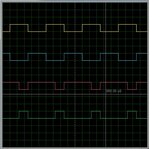abc_de
Full Member level 5

- Joined
- Jan 9, 2014
- Messages
- 243
- Helped
- 11
- Reputation
- 22
- Reaction score
- 11
- Trophy points
- 1,298
- Location
- Ludhiana ਪੰਜਾਬ
- Activity points
- 2,939
hello
i am working on pwer control pwm of pic18f4431 and try get variable duty cycle of PWM
at 20 khz on all pwm pins. all pwm channels are configure in complementary mde.
i am facing problem while changing duty cycle, frequency of pwm signal is perfect. please help me:???::???:
here is my code
i am working on pwer control pwm of pic18f4431 and try get variable duty cycle of PWM
at 20 khz on all pwm pins. all pwm channels are configure in complementary mde.
i am facing problem while changing duty cycle, frequency of pwm signal is perfect. please help me:???::???:
here is my code
Code:
#include"p18f4431.h"
#pragma config OSC = IRCIO // INTERNAL OSCILLATOR IS ON
#pragma config DEBUG = OFF // DEBUGGER IS OFF
#pragma config LVP = OFF // Low-voltage ICSP disabled
#pragma config PWRTEN = OFF // PWRTEN Disabled
#pragma config WDTEN = OFF // WDT disabled
#pragma config MCLRE = ON // MCLR Pin Enabled
#pragma config BOREN = OFF // Brown-out Reset disabled
#pragma config PWMPIN = OFF // PWM outputs disabled upon Reset (default)
#pragma config LPOL = HIGH // PWM0, 2, 4 and 6 are active-high
#pragma config HPOL = HIGH // PWM1, 3, 5 and 7 are active-high
#pragma config PWM4MX = RB5 // PWM4 output is multiplexed with RB5
#pragma config FLTAMX = RC1 // FLTA input is multiplexed with RC1
#pragma config SSPMX = RC7 // SCK/SCL clocks and SDA/SDI data are multiplexed with RC5 and RC4, respectively. SDO output is multiplexed with RC7.
#pragma config EXCLKMX = RC3 // TMR0/T5CKI external clock input is multiplexed with RC3
void pwm_int(void);
void pwm_int(void)
{
PORTB=0x00;
TRISBbits.TRISB0=0; // PWM0
TRISBbits.TRISB1=0; // PWM1
TRISBbits.TRISB2=0; // PWM2
TRISBbits.TRISB3=0; // PWM3
TRISBbits.TRISB5=0; // PWM4
TRISBbits.TRISB4=0; // PWM5
TRISDbits.TRISD6=0; // PWM6
TRISDbits.TRISD7=0; // PWM7
// interrupt control register
INTCON=0XC0; // enabl;e globle and peripheral interrupts
IPR3bits.PTIP=1; // enable timer 1 interrupt priorty high
PIE3bits.PTIE=1; // enable timer 1
PIR3bits.PTIF=0; // disable timer 1 flag
// PWM Special Event Compare Registers
SEVTCMPL=0X00;
SEVTCMPH=0X00;
//DEAD TIME CONTROL REGISTER
DTCON=8; // dead time arround 2 usec
//FAULT CONFIGURATION REGISTER
FLTCONFIG=0X00; // disable fault detection feature
//OUTPUT OVERRIDE CONTROL REGISTER
OVDCOND=0XFF; // Output on PWM I/O pin is controlled by the value in the Duty Cycle register and the PWM time base.
// OUTPUT STATE REGISTER
OVDCONS=0X00; // Output on PWM I/O pin is INACTIVE when the corresponding PWM output override bit is cleared.
// pwm timer register
PTMRL=0X00; // PWM Time Base (lower 8 bits)
PTMRH=0X00; // PWM Time Base (upper 4 bits)
// PWM TIMER CONTROL REGISTER 0
PTCON0=0X00; // 1:1 Postscale,Fosc/4 (1:1 prescale),Free Running mode
// PWM TIMER CONTROL REGISTER 1
PTCON1=0X80; // PWM time base is ON
// PWM CONTROL REGISTER 0
PWMCON0=0X50; // All PWM I/O pins enabled for PWM output, complementary mode
// PWM CONTROL REGISTER 1
PWMCON1=0X01;
//PWM Time Base Period Registers
PTPERL=124; // PWM Time Base Period (lower 8 bits)
PTPERH0; // PWM Time Base Period (upper 4 bits)
//PWM Duty cycle registers
PDC0L=60; // PWM Duty Cycle #0L register (Lower 8 bits)
PDC0H=0; // PWM Duty Cycle #0H register (Upper 6 bits)
PDC1L=60; // PWM Duty Cycle #1L register (Lower 8 bits)
PDC1H=0; // PWM Duty Cycle #2H register (Upper 6 bits)
PDC2L=60; // PWM Duty Cycle #2L register (Lower 8 bits)
PDC2H=0; // PWM Duty Cycle #2H register (Upper 6 bits)
PDC3L=60; // PWM Duty Cycle #3L register (Lower 8 bits)
PDC3H=0; // PWM Duty Cycle #3H register (Upper 6 bits)
ADCON0=0x00;// ADC MODULE IS DISABLE
}
void main(void)
{
OSCCON=0X72; // internal osc. at 8 mhz
ANSEL0=ANSEL1=0X00; // disable analog pins
pwm_int();
while(1);
}
Last edited:




